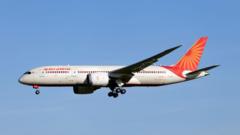Boeing is confronted with a major strike by more than 3,200 of its defense employees, who are protesting over unsatisfactory pay and conditions, marking a notable challenge for the beleaguered firm.
Boeing's Defence Division Faces Strike, Adding Pressure to Struggling Giant

Boeing's Defence Division Faces Strike, Adding Pressure to Struggling Giant
A significant strike by over 3,000 workers at Boeing's defense division signifies another setback for the aerospace titan.
More than 3,200 workers at Boeing's defense division initiated a strike on Monday, with the move signaling a new challenge for the struggling aviation giant. Employees at facilities in Missouri and Illinois, who specialize in building military aircraft such as F-15 fighter jets, voted against the company's recent contract offer primarily due to concerns related to pay, work schedules, and retirement benefits.
In a response to the strike, Dan Gillian, vice president of Boeing's Air Dominance unit, stated that the company was disappointed by the rejection, emphasizing that the offer included an average wage increase of 40%. The strike comes at a time when Boeing is already navigating through turbulent waters following a past of safety scandals and operational setbacks, prominently highlighted by an extensive eight-week walkout involving passenger plane workers last year.
The action is being spearheaded by a local branch of the International Association of Machinists and Aerospace Workers (IAM) based in St. Louis, where Boeing's defense manufacturing hub resides. A tweet from the union stated, "3,200 highly-skilled IAM Union members at Boeing went on strike at midnight because enough is enough. This is about respect and dignity, not empty promises." IAM, representing roughly 600,000 workers across various sectors including aerospace, defense, shipbuilding, and manufacturing, is one of the largest unions in the U.S.
Notably, this is the first strike affecting Boeing's defense sector since 1996, when a similar walkout disrupted operations for over three months. However, CEO Kelly Ortberg attempted to downplay the potential repercussions, asserting the current strike's scale is significantly less impactful than last year’s massive strike involving 30,000 passenger plane workers, which had severe financial implications for the company.
Boeing has been facing a wave of crises, including fatal incidents involving its aircraft. In 2018, a Boeing 737 crash in Indonesia resulted in 189 fatalities, followed by another deadly crash in Ethiopia. More recently, an incident in 2024 involved a mid-flight malfunction of a panel on a Boeing 737 Max. Amid these challenges, the company reported delivering just 348 aircraft last year, which represents its lowest output since the onset of the pandemic.























